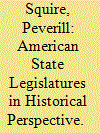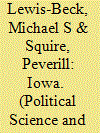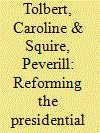| Srl | Item |
| 1 |
ID:
167335


|
|
|
| 2 |
ID:
090235


|
|
|
|
|
| Publication |
2009.
|
| Summary/Abstract |
There are perhaps many good arguments for Iowa maintaining its "first in the nation" status, in terms of the presidential nomination process. The strongest, however, would seem to be an argument that it is representative of the nation as a whole. That is, somehow, Iowa is a microcosm of the national political forces, faithfully mirroring the relevant electoral structures and choices of the macro-stage. This belief is certainly held by some. Palo Alto County, in northwestern Iowa, has long been considered a presidential bellwether, faithfully voting with the winning candidate in a series beginning in 1916. But as media worthy as that fact might be, it seems most likely a product of chance, for its heavily rural, northern European-descended population make it far from demographically representative of contemporary America (Lewis-Beck and Rice 1992, 4-6). A similar charge is commonly made today against the state as a whole, by political commentators across the land. But is it true? Is Iowa really unrepresentative? That is the question we seek to answer.
|
|
|
|
|
|
|
|
|
|
|
|
|
|
|
|
| 3 |
ID:
090228


|
|
|
|
|
| Publication |
2009.
|
| Summary/Abstract |
The 2008 presidential nomination was marked by the most aggressive frontloading in recent history; the process was a mess from the outset. Frontloading is the trend in recent presidential nominations in which states schedule their primaries and caucuses near the beginning of the delegate-selection season to have a greater impact on the process. In 1976, 10% of the delegates had been chosen by March 2. In 2008, 70% of the delegates had been chosen by that same date. As part of their ongoing efforts to address frontloading and other problems, both the Democratic National Committee (DNC) and Republican National Committee (RNC) revised the schedules and rules for 2008 presidential primary elections and caucuses.
|
|
|
|
|
|
|
|
|
|
|
|
|
|
|
|